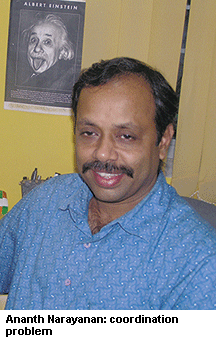THE SOUTHEM LITTORAL STATE of Tamil Nadu (pop: 72 million) boasts 99 percent enrolment in government primary schools and prides itself on its mid-day meal and other welfare programmes. However a recent survey of the country’s 1.20 million government schools conducted by the Union ministry of human resource development and based on District Information System for Education (DISE) data for 2013-14, paints a grim picture of lack of toilet facilities in a sizeable number of Tamil Nadu’s 37,002 government schools.
 According to the survey, 1,442 girls and 4,278 boys schools have no toilets at all and another 958 girls and 1,159 boys schools lack functional toilets. In effect, 21 percent of government schools in Tamil Nadu function without toilets. In over half (16) of the state’s 30 districts there are at least 100 primaries without toilet facilities. Only the state capital Chennai has toilet facilities in all government schools excepting one girls’ school which lacked a functional toilet. Government schools in Gujarat, Goa, Sikkim and Karnataka are better off than Tamil Nadu in this respect.
According to the survey, 1,442 girls and 4,278 boys schools have no toilets at all and another 958 girls and 1,159 boys schools lack functional toilets. In effect, 21 percent of government schools in Tamil Nadu function without toilets. In over half (16) of the state’s 30 districts there are at least 100 primaries without toilet facilities. Only the state capital Chennai has toilet facilities in all government schools excepting one girls’ school which lacked a functional toilet. Government schools in Gujarat, Goa, Sikkim and Karnataka are better off than Tamil Nadu in this respect.
Against the backdrop of prime minister Narendra Modi’s maiden Independence Day speech in which he gave top priority to equipping all schools with toilets — especially girls’ toilets — the HRD ministry’s survey has shocked and angered educationists in Tamil Nadu, and sparked a political row with opposition parties demanding that the ruling AIADMK government take immediate steps to remedy the situation. According to opposition party leaders, the survey results “totally contradict” the announcement made in August by former chief minister Jayalalithaa (jailed on corruption charges on September 27) in the legislative assembly, that 2,057 schools have been provided toilets. At the time Jayalalithaa had also announced an allocation of Rs.72.90 crore for construction of classrooms and 270 toilets exclusively for girl students in elementary and middle schools.
According to NGO activists in Chennai who have been crusading for improved toilet facilities in government schools, although the state government increases its budget for school education annually, providing clean, usable toilets has never been a priority. This despite the Supreme Court directing all state governments in October 2011 to ensure that schools are provided with temporary toilet facilities by November 2011 and permanent toilets by December 2011.
A survey conducted by the Leadership through Education and Action Foundation (LEAF) Society together with 12 NGOs of the WASH network in June 2013, to assess the condition of 1,623 toilets in 489 government schools in ten districts, found that sanitation is grossly inadequate in 90 percent of schools. “As per the Right to Education Act, a toilet-student ratio of 1:20 for primary, 1:35 for upper primary and 1:40 for high school has to be maintained. However, Tamil Nadu’s current ratio is 1:158.
Maintenance of toilets is a major problem and the survey found that 102 out of 489 schools forced children to maintain school toilets, 431 lacked facilities for adolescent girls to change sanitary napkins and 228 schools which enrolled the physically challenged didn’t provide separate toilet facilities for them,” says Sathiya Nesan of LEAF Society.
However, the root of the problem according to informed education activists is confusion about whose responsibility it is to ensure clean, functional toilets with adequate water supply in government schools. “There has to be an attitudinal change among students and teachers on the issue of maintaining toilets. Cleaning toilets should be regarded a dignified job and become part of the learning process with teachers and students working together to keep toilets clean, instead of forcing the job on students as is the practice currently. Moreover, a major problem is the lack of coordination among different government departments including the Sarva Shiksha Abhiyan which is obliged to construct toilets and other departments in charge of drinking water and sanitation, with the result that although toilets exist in some government schools, they lack water supply and are therefore unusable,” says Ananth Narayanan, founder-director of the Chennai-based Innovative Network for School Evolution (INFORSE).
Clearly, the state government needs to heed the advice of activists and rethink its strategies for building, cleaning and maintaining toilets in government schools. Apart from provision of funds, they also need to make school managements and government officials accountable for maintaining toilets. Lofty rhetoric and pronouncements need to be backed by intelligent last mile implementation.
Hemalatha Raghupathi (Chennai)